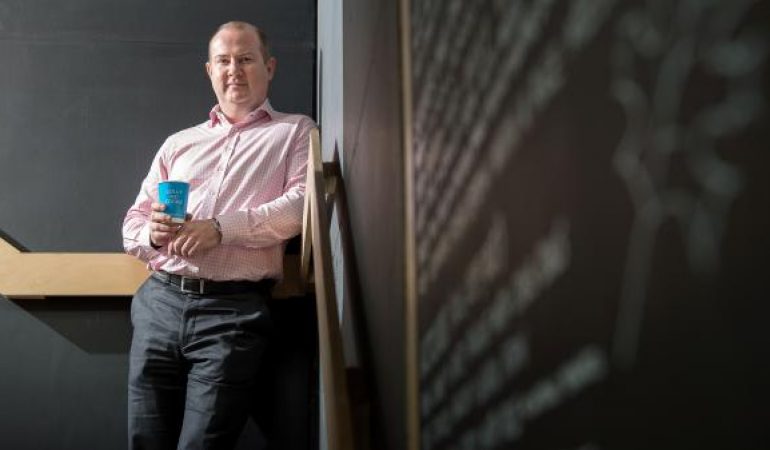We will fill the missing link for SME funding
A talented accountant says he wishes to make Linked Finance the largest lender in the country with the non-bank background.

You have to take some pains to get to the current chief executive of Linked Finance. You need to go to the red-brick headquarters on Dublin’s Liffey Street and find a strong grey door in there. It will lead you through narrow stairs up to the highest floor of the complex.
There you will see Niall Dorrian resting with his coffee and snacks on the sofa. For him, it’s the control console of the company where he plans the future increasing of it to twice as large capacity as it has now. According to Dorrian, he looks at the opportunities the company has, not on the current state of affairs.
Dorrian was introduced to the founder of Linked Finance, Peter O’Mahony, by headhunters. Also at the table was Frontline Ventures, a fund that put €2.5m into the company last year for a stake of about 25%.
A native of Bangor, Co Down, Dorrian’s corporate teeth had been sharpened by nearly a decade in the Caribbean with drinks giant Diageo and with Digicel, Denis O’Brien’s telecoms operator. Fintech, meaning financial technology, appealed. Peer-to-peer lending, which links lenders directly to borrowers online, has exploded elsewhere but is early-stage in Ireland.
O’Mahony had set up Linked Finance in 2013, rounding up family and friends as investors including chairman Kingsley Aikins, a former head of the Worldwide Ireland Funds. So far, the company has lent more than €11m to nearly 500 businesses. The plan now is to ramp up under Dorrian’s leadership.
A giant banner on the wall above Paddy Power exhorts passers-by: “Earn up to 15% on your savings.” How? “Start lending to Irish SMEs on Linked Finance.”
Dorrian sees “discouraged” Irish SME borrowers as a ready market. “Go back to 2008 and the SME market was €45bn in terms of loans. I think we will agree that was too high and overleveraged — but it is now below €20bn.”
SMEs, he claims, are discouraged by eight years during which banks were seen to have closed doors; by the hoops they think they will have to tackle; by banks’ focus on asset-backed lending. “SMEs don’t typically have big finance departments, don’t have financial planning. It’s about responsiveness to opportunities that come up.”
The cupcake maker Lolly and Cooks borrowed €50,000 recently to open two new outlets, for example — its second loan through Linked Finance. Viking Splash Tours borrowed €50,000 to develop a new amphibious vehicle.
Two weeks ago, Linked Finance changed from online loan auctions, where investors bid a rate, to a fixed-rate graded loan system. It has since issued loans of more than €600,000; a €40,000 loan to Tipperary stove supplier Ryan Stoves was funded in less than eight hours.
Linked Finance’s average loan size is €30,000, and Dorrian says that credit assessment is based mostly off six months’ bank statements. “We will give a decision within eight hours.” Typically, he says, a borrower has been on the go for more than two years, has good cash flows and is generally profitable. Just over half of would-be borrowers are rejected, and default rates are slightly above 1%.
Targets are aggressive — to lend €350m by the end of 2019. “Even if we achieve that we are still only going to be around 4% market share . . . It’s not a question of you just sit back.”
An accountant by training, Dorrian claims that he set his sights on finance at age nine, when his uncle, “a successful banker in Canada”, advised him that to do well in business he had to understand finance. “It’s a bit sad, I know, but it’s actually true.”
He studied accountancy and finance in Heriot-Watt University in Edinburgh. After a stint in an accounting firm back in Northern Ireland, he had enough of practice. He finished his accountancy training in Belfast businesses, from concrete to ship outfitting, then set out to seek adventure. “I always regretted not doing the travel thing after college.”
Diageo offered the scent of excitement. After three years as finance manager of its Belfast bottling and canning plant, Dorrian moved to Jamaica in 2004 as finance and strategy director of Red Stripe. Jamaica’s top beer brand was in decline domestically against rum, and he spent two years focused on improving production efficiency and developing export markets.
Meanwhile, in Kingstown’s small expat community, his path crossed often with other young Irish people working for a growing operation, Digicel. Several invitations to join came Dorrian’s way. When his Jamaican contract with Diageo was coming to an end, he asked Digicel what it would offer. “They came back to me with the position of chief operating officer. That enabled me to move out of finance, which was always my career plan, faster than I would have in Diageo.”
He spent 10 months in the role in Jamaica — “a steep learning curve” — before getting the job of chief executive of the Trinidad and Tobago operation the following summer. He was 35 and loved it. “Trinidad and Tobago moved from loss-making in my first year to well over $100m ebitda over about five years.”
Dorrian’s LinkedIn profile mentions his “ruthless” approach to cost control, which made Trinidad and Tobago a “benchmark” for Digicel. “[O’Brien] challenges you to think about things differently, to be able to change a plan when things don’t work out.” He also enjoyed the work-hard, play-hard lifestyle. “Some of the best parties you are ever likely to go to are in Trinidad.” One of his proud achievements, he says, is that locals displaced expats in management by the time he left in early 2012.
A dual responsibility from 2010 as regional chief executive exposed him to Suriname, Guyana and the eastern Caribbean. Eventually, though, home beckoned. “I had always said to myself, if you are away any more than 10 years, you are probably not coming home.” He told Digicel he was on the way out but agreed to a short-term assignment turning around the Panama operation and recruiting a local chief executive. At Christmas 2012 he and his wife finally came back to Europe — first spending a ski season cooling off in the French Alps.
Fresh off the slopes, he started a job as director of mobile at Eircom. He left in January 2015, months after a flotation was pulled. “I decided my skill set and personality were more suited to high-growth companies.” That personality is “straight down the middle”, he says. “What you see is what you get.”
Digicel lines were still open and he did work for the company for six months last year while waiting for the right chief executive job to come up.
At Linked Finance, the plan includes diversifying its liquidity base to target pension funds, investment houses, family offices, high net worth individuals. Dorrian says Linked Finance has “ongoing” talks with the Strategic Banking Corporation of Ireland, whose remit is to fund SMEs.
His eye is also on the €90bn of consumer deposits in Ireland. In a climate of low to negative interest rates, where Bank of Ireland has even begun charging for big corporate deposits, he says peer-to-peer lending can be promoted as an attractive asset class. The British government has recognised peer-to-peer lending as an eligible asset class for tax-incentivised ISAs (individual savings accounts).
Peer-to-peer lending has had its controversies. In the US, a scandal erupted this year around irregularities at leader Lending Club. In the UK, Lord Adair Turner, former chairman of the UK’s Financial Services Authority, predicted that the sector could end up making the “worst bankers look like absolute lending geniuses”.
There will always be “scaremongers” about something new, says Dorrian. “The first people through the wall always get a bloody nose.” Good regulation is key to reassuring lenders and borrowers, he says. Regulation was put in place in the UK in 2014 and is under review. Dorrian says Linked Finance uses UK regulations as operating principles. With the Central Bank of Ireland preparing to launch a public consultation around regulation, he says “we don’t need to look too far for a model”.
Linked Finance, which has 16 staff, will look at a new funding round within the next year and is targeting profitability in 2019. A move, possibly to the IFSC, is on the cards. And that’s just the start. “We want to be the biggest non-bank lender in Ireland,” says Dorrian, who also intends to look at European expansion.
He harks back to Digicel, whose significance he says is widely underestimated: “It has changed telecoms in the Caribbean the way Ryanair changed travel in Europe.” Dorrian, who turned 45 on Friday, feels equally perky. Challengers like Linked Finance change markets, he says.
“They change how people do things — and that’s a good thing.”







